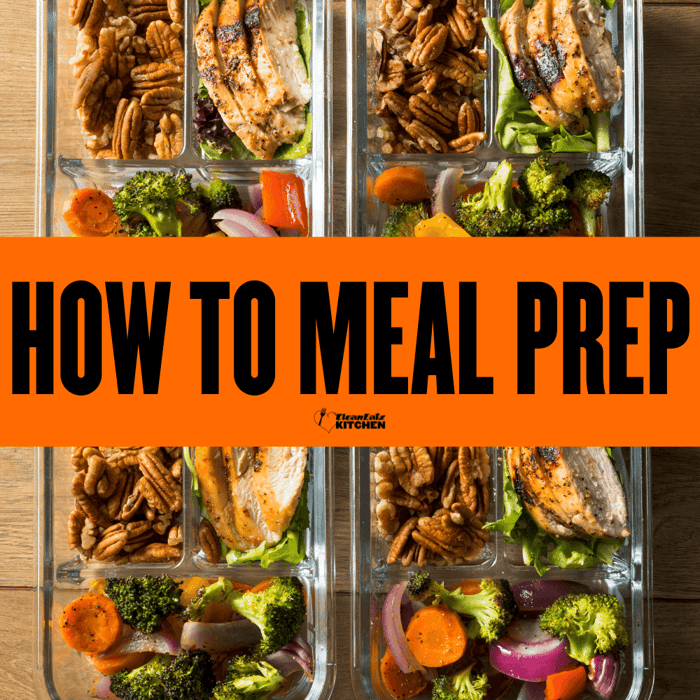How to Prep Food for The Week: Prepare Meals for a Successful Week

Jason Nista
Nutrition
|
Healthy Recipes
|
Healthy Lifestyle
10/20/2022 12:00pm
8 minute read
How to prep food for the week? Prepping food for the week is definitely not easy. If you were looking for a secret weapon to help you achieve your weight loss and fitness goals in record time, you probably can’t do better than meal planning and meal prepping. The idea is very simple if you have lots of nutritious and healthy foods at hand at all times, it is less likely that you’ll have a snack or some takeout, which are highly associated with obesity and being overweight if you had a stressful day or don’t feel like cooking.
Let's read the article and discover everything about meal prep food for the week.
Why is Meal-Prepping Such a Great Tool
Why and how to prep food for the week? Prepping food for the week has tons of benefits that you can get from doing this, just to name a few:
Health improves: By staying on top of your nutrition you’re also making sure you get plenty of whole, nutritious foods. If you want to know why choosing mostly whole foods is so good for you, you can check out this amazing article.
Save money: By helping you order less takeout every week, helping you buy groceries smarter to fit better in your budget, and your power bill will also grow smaller from cooking all your meals just one or two days a week.
Weight loss: By prepping your meals in advance you, without noticing, pay a lot more attention to what you’re eating, the ingredients you buy, and the portions you have on each meal. All of these will help you stay on track with your calories and how much you eat and boost your weight loss meal planning efforts.
Save time: It doesn't take that much time to cook a few extra portions of a meal for several days so on your prepping days you won’t have to spend the whole day in the kitchen. And your whole week will go smoother by not having to worry about cooking and just grabbing something already made from the fridge.
Reduces stress from decision making: By having all your healthy meals prepped you are free from having to make last-minute decisions and fight the craving for fast food or some rush prepping, especially if you had a very tough day at work. You won’t have to resort to willpower to choose between a cauliflower crust pizza or a healthy whole meal, because that choice is already made for you
Hopefully, these are good enough to convince you to give meal prepping a chance, so let’s look at how to go about it.
Prepping The Meal Prep
How to prep food for the week? and how to do meal prep for a week? Before you start planning your next grocery shop and cooking day take a few things into consideration to make it a success:
-
Talk with your family and come up with a list of foods and meals that they enjoy, then pick some and decide on a whole week's worth of meals, try to repeat some meals on different days so you have less preparation time. Bonus points if you can come up with healthier versions of those meals or ways to add more protein or vegetables or you can check our article on great healthy dinner ideas for some inspiration for your recipes.
-
With your meals decided, create your grocery shopping list filled with whole nutritious ingredients, and make sure you include these foods that can help you lose weight. This will probably not be very different from a regular shopping list if you were cooking every day in quantity or price.
-
Pick your meal prep day, usually, Sunday works well for most people, and book some time for your cooking. Also, check your kitchen to make sure you have all the implements you’ll need, especially some Tupperware or other recipients where you’ll store the cooked food, portioning out all of your meals is a great way to do it if you have enough containers.
-
If cooking meals for a whole week seems daunting you can start by prepping your meals for the next 2-3 days.
-
Make sure that you take care of any preparation needed a day before. For example, soaking beans or chickpeas one night before.
Cooking Day
It should not take you longer to prepare more portions of a specific food than it should take to cook just one portion. But make sure to use these tips to save some time and make your prepping day a breeze:
-
Make sure you have everything you need to start prepping, oil, butter, salt, pepper, pots, and pans.
-
Focus first on the preparations that will take longer to cook and be ready. Anything that needs to go in the oven, proteins like meat, chicken, and fish; whole grains like brown rice, or quinoa, dried beans and legumes. Make sure you have timers or alarms on your phone to stay on top of cooking times.
-
While those are in the oven you can go ahead with other faster preparations like chopping veggies or fruit, fast-cooking rice, stir fry recipes, etc.
-
Let your meals cool before packing them and storing them in the fridge.
Storage
Refrigeration and freezing are essential steps to successful meal prepping so you don’t get sick and your cooking effort doesn’t go to waste. Here are a few tips to store your prepped meals:
-
Make sure you date and label what goes in the freezer so you know what you already have at hand and what you need to eat next.
-
Rotate stored items so that the oldest foods/meals are kept up front and eaten first. Store highly perishable items like greens, herbs, and chopped fruits front and center close to eye level so you remember to use them.
-
If you’re freezing something: Cooked meals freeze better in airtight containers. Some foods with high water content like salads, tomatoes, or watermelon tend to become mushy when frozen and later thawed.
-
Here are some recommended times for various cooked foods to make sure you don’t get sick and keep the flavor and nutrient content:
-
Refrigeration at 40°F or lower:
1-2 days: Cooked ground poultry or ground beef
3-4 days: Cooked whole meats, fish, and poultry; soups and stews
5 days: Cooked beans; hummus
1 week: Hard-boiled eggs; chopped vegetables stored in an air-tight container
2 weeks: Soft cheese, opened
5-6 weeks: Hard cheese, opened
-
Freezing at 0°F or lower:
2-3 months: Soups and stews; cooked beans
3-6 months: Cooked or ground meat and poultry
6-8 months: Berries and chopped fruit (banana, apples, pears, plums, mango) stored in a freezer bag
8-12 months: Vegetables, if blanched first for about 3-5 minutes (depending on the vegetable)
Don't forget to check out Clean Eatz Kitchen's meal plan delivery services for healthy options like these.
Final Thoughts
As you can see meal prepping does require some preparation and work but is not as complicated as it sounds. Hopefully, this guide helps you understand the power behind meal prepping and how it can help you achieve your goals. Here are some takeaways and final advice for your meal-prepping journey:
Meal prepping has lots of benefits if it is done appropriately, always stay on the safe side and follow good practices when cooking and storing your meals so you avoid getting sick or wasting your meals.
Start small if it seems too daunting at first, maybe prep meals for just the next couple of days and see how it goes.
The more you practice meal prepping the better you get at it, the less time it takes and the cheaper your budget will be as you’ll better assess the quantities of groceries you buy. Make sure you take some notes of your prepping days on recipes, prep, and cooking time.
FAQ
Can I meal prep for special diets or dietary restrictions?
Absolutely. Meal prep can be customized to accommodate various dietary needs, including vegetarian, vegan, gluten-free, or low-carb diets. Look for recipes that align with your dietary preferences.
How do I avoid overcooking or undercooking my prepped meals?
Follow recipes carefully and use kitchen timers to prevent overcooking. Invest in a food thermometer to ensure proteins are cooked to a safe internal temperature.
Is it possible to reheat prepped meals without compromising taste and texture?
Yes, reheating can be done in the microwave, on the stove, or in the oven. Add a splash of water to maintain moisture and use lower heat settings to prevent overcooking.
Can I meal prep snacks and breakfasts too?
Absolutely. Prepping snacks like cut fruits, yogurt parfaits, or energy bars can help you avoid unhealthy choices. For breakfast, prepare overnight oats, egg muffins, or smoothie packs.
How do I stay motivated to meal prep consistently?
Set a designated meal prep day and make it a routine. Involve a friend or family member to keep it enjoyable. Experiment with new recipes to keep things exciting.
Related Articles
10 Tips for Healthy Cooking
8 minute read



